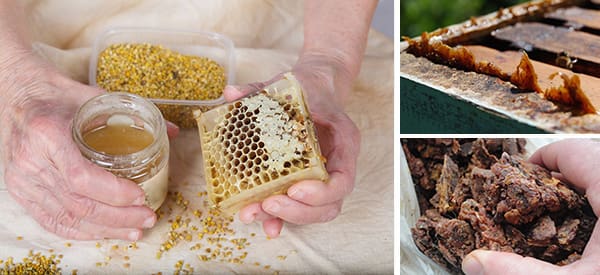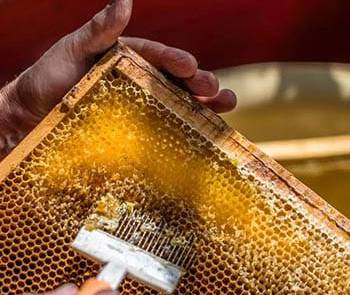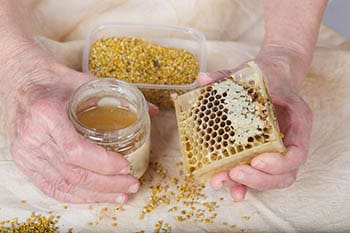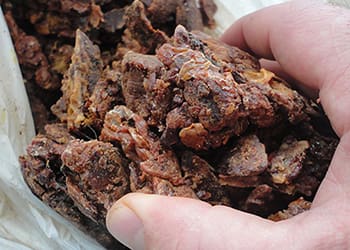
When and Why You Should Take Propolis
Propolis has been used throughout history, but it is making a comeback in modern times as a way to help with many health problems. Propolis and medications including propolis are even available in local stores and pharmacies now.
Of course, it is normal to be cautious of ingredients you don’t know. You may be wondering what propolis is, its benefits, and even when you should take it. But don’t worry, propolis is a natural ingredient with a lot of benefits and very few side effects.
What is Propolis?
Propolis is a natural ingredient that is made from bees. It is a resin and is made from a variety of ingredients including beeswax, saliva from bees, and materials from various plants and trees. In a few basic studies of the material, it is said to have over 300 different compounds.
Depending on the bees, and the locations, the exact number of compounds and the makeup of the compounds can differ. However, a general guideline is that propolis is made up of:
 50% resins from plants (mostly sticky plants like pines)
50% resins from plants (mostly sticky plants like pines)- 30% beeswax
- 10% oils
- 5% pollen
- 5% polyphenols (type of antioxidant)
Part of the reason this substance hasn’t been studied properly and its health benefits made public is due to the variability of the contents. Since every country, and even regions or states, can have slightly different makeups of propolis from the bees, it can be hard to determine what the health benefits and dangers are across all regions.
Though it hasn’t been studied much, people have been using propolis for a long time. It was used by Greeks and Assyrians to fight infections, treat abscesses, and embalm mummies.
Bees specifically use it as a sealant to repair their hives when damaged and to minimize intruders.
What Is Propolis Used For?
Propolis is used for a variety of things. It is said to have antibacterial, antiviral, antifungal, and anti-inflammatory properties.
There are plenty of things Propolis is used for. Some are everyday problems, while others are more specific.
Sores & Herpes
Some ointments are said to help with cold sores or herpes. Additionally, propolis, when used by itself, is said to reduce the amount of herpes virus present in the body.
Wounds
One of the antioxidants in propolis, pinocembrin, acts as an antifungal, antimicrobial, and anti-inflammatory. These properties allow the body to heal wounds faster when applied topically.
Propolis has been found to help heal burns faster and work better than steroid creams in most cases.
Viruses
Since propolis has antiviral properties, there is an argument that it should benefit those who suffer from a viral infection. It works well against the common cold and the flu. In addition to having antiviral properties, it also seems to boost immunity.
Inflammation
Propolis can help with wound and injury inflammation, but it can also help with arthritis inflammation. Propolis reduces swelling and inflammation all over the body.
Allergies
Like most byproducts of bees, propolis is thought to be beneficial to those with allergies. Taking propolis from local bees, similar to ingesting bee pollen or honey from local bees, may help your body adjust to local allergens.
Some suggest that propolis contains specific anti-allergy components as well, but this hasn’t been tested.
Oral Hygiene
Propolis is said to reduce dental plaque by preventing the formation of calcium phosphate in the mouth. It is also antibacterial, which can prevent complications after dental interventions.
Related: The Only 4 Antibiotics People Should Stockpile (Video)
Cancer
There haven’t been a lot of studies on the benefits of propolis on cancer, but some studies and properties in propolis suggest that it may have anti-cancerous abilities. Taking propolis has the potential to stop cells from multiplying, reduce the chances of cancerous cells forming, and block the pathways that allow cancer cells to communicate with one another.
The studies that were conducted on its anti-cancer benefits suggest that propolis could be used as an accompaniment to other cancer treatments.
When Is the Best Time to Take Propolis?
Depending on the strength of the propolis and the way you are using it, you can use propolis anywhere between one to three times a day.
To make sure there are no side-effects, you should start once a day, and slowly increase the dosage from there. Most people recommend taking it early in the morning, or with your breakfast.
What Forms Can You Take Propolis In?
There are three ways that propolis is commonly used. Orally is one of the common ways to take it for overall health. Propolis can be used in the form of: liquid extract, capsule, lozenge, or tablet.
If you are applying it topically, there are creams, ointments, and lotions. All of these are items you can find in stores. However, if you’re purchasing from local beekeepers, they’ll present you other ways you can take propolis, such as ingesting it raw, mixed with honey, or powdered.
Can Propolis Be Taken Daily?
Since scientists haven’t studied it in great detail, there is no specific dosage or daily amount that is recommended. However, most people say you can use it every day, and sometimes even multiple times a day without a problem.
From trial and error, many people seem to find that about 500 milligrams of bee propolis once or twice a day is the ideal dosage. If you are buying a product from the store, there should be instructions on the label which you should follow, as it might have other ingredients mixed in with the propolis that aren’t safe to take in large doses.
What Are the Side Effects of Propolis?
There are only two side effects of propolis that have been widely documented. The first is an allergic reaction. If someone has previously been found to be allergic to bees or bee byproducts, they should avoid propolis.
The other side effect that occurs sometimes comes almost primarily from lozenges. Some people have found that using a fair amount of these lozenges irritates the mouth and ulcers occasionally.
Additionally, propolis has been found to react to certain drugs. So, if you are taking OTC medication, it is a good idea to check with your doctor first.
Propolis, like many byproducts of bees, is said to have a lot of health benefits. Unfortunately, due to the differences between different hives and locations, it is difficult to determine which benefits come from the resin itself, and which come from the local plants themselves. But it’s worth giving it a try and seeing if it benefits you.
You may also like:
How to Infuse Honey with Elderberry
The Best Flowers to Attract Beneficial Insects to Your Garden (Video)
When And How To Use Manuka Honey

 50% resins from plants (mostly sticky plants like pines)
50% resins from plants (mostly sticky plants like pines)


What brand of propolis do you recommend?
I use NOW Propolis 2000 5:1 extract 90 soft gels. Prefer it to the extract powder veg capsules.
I’ve been trying to reach Nicole. We do a gathering on my ranch in June and would love to have Nicole attend. Reach out to me and thank you. I really enjoy the info you send. Ken Wade 801-597-3377
Hello Ken,
Thank you for your interest in Nicole’s work!
We will make sure to let her know about your invitation!
Many blessings and good health!
difference between the pollen and propolis? and definitely organic,
What an amazing bit of information regards my favorite natural remedy .
I have used it for decades mainly in tincture form both with and without alcohol.
One use missed out on the list is what we call Bali Belly , (the runs from 3rd World kitchens)
Take 3 drops in water straight down the throat and go back to enjoying your holiday.
Wow I confirm the lozenge allergy , I bought some fancy honey/propolis, expensive lozenges in the Jean Batten Airport NZ and suffered for days with mouth ulcers ????
I believe the Bees use the Propolis to also / mainly avoid outside infection which could devestate the whole hive.
Oh I noticed a typo at the beginning Propolis is not made FROM BEES , it is made BY Bees , love the little guys, humanity depends on them .